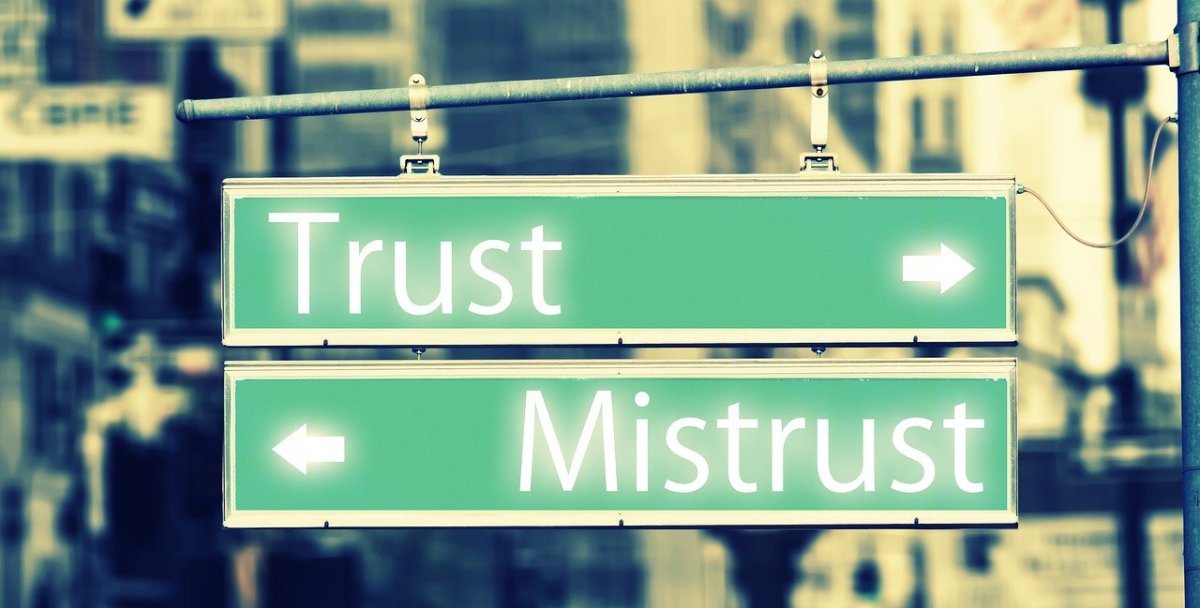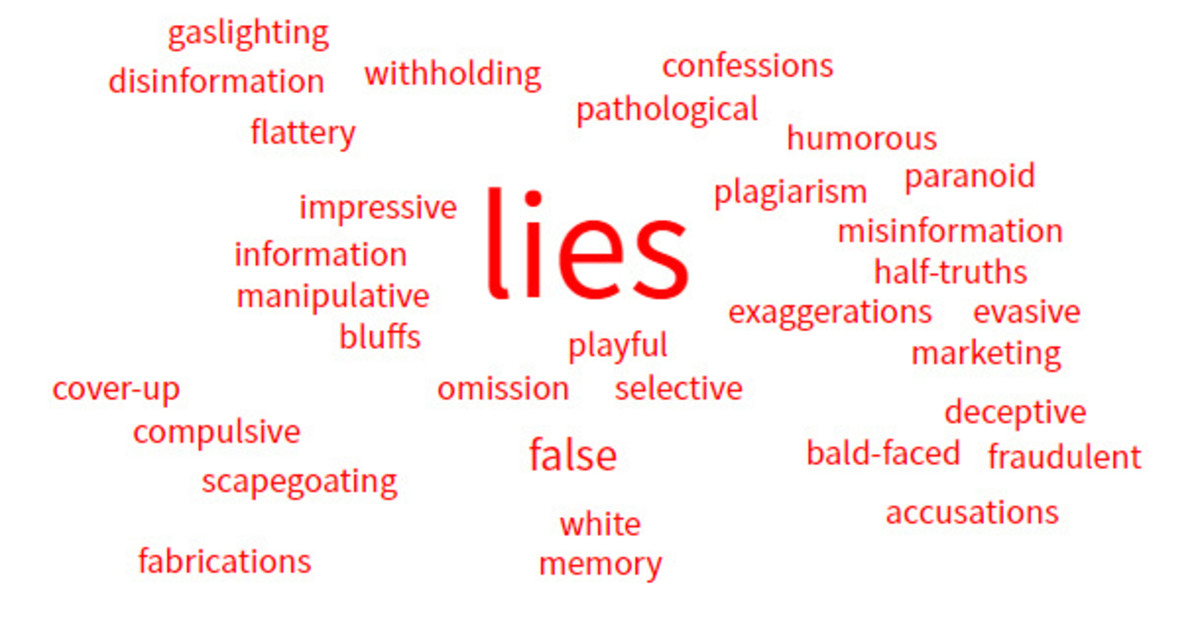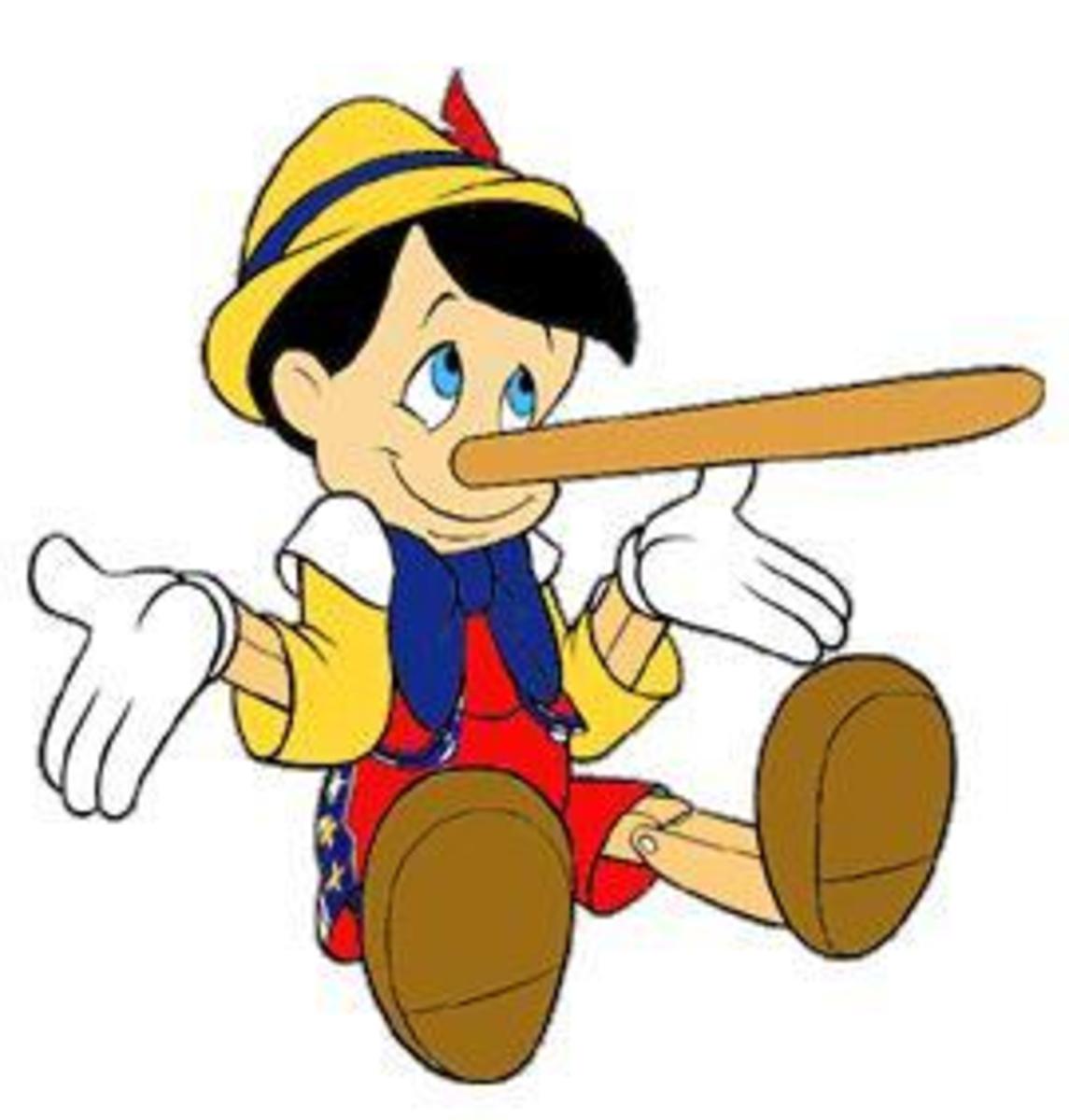Sentence Sermons (Christian Inspiration) #73 --- Lies
Quotations on Lies (Set No. 2)
When a man tells a lie it means that some consideration, usually a selfish one, has got so prominently into the foreground that he is willing to violate certain rules which have been recognized as the foundation of all good business dealing. We all recognize that no man is worthy of our tolerance who departs from the truth for selfish reasons, or who habitually neglects it for any reasons whatever. The integrity of the spoken word is a necessity among a people which desires to get its business efficiently and straightforwardly done. It is impossible to get the complex needs of modern life satisfied or the complex forces of society rules unless the businessmen and the political leaders keep their word to one another. Therefore any man who is found to be physically untruthful is first distrusted and then cast out, just as completely as we distrust and cast out the man who is physically uncleanly.
---Arthur T. Hadley, New York Tribune, New York, N.Y., June 24, 1907.
It is a bad thing to tell a lie that will do no harm to anybody, very much worse to give utterance to a calumny and falsely impute to an individual or to a body of men actions or intentions that will bring them into disrepute, but the worst of all is to perpetuate that unjust lie by writing, printing and publishing it, and advertising it to the unsuspecting as history and truth. It matters not whether the calumny concern Catholic or Protestant, friend or foe, having nothing to do with it. The man who has any share in such a transaction is a rascal. If you must need and deal with him, be ever on your guard. He cannot be trusted.
---Theophile Meerschaert, The Indian Advocate, Sacred Heart, Okla., September 1902.
“Let him refrain . . . his lips from deceitful words.” (See 1 Peter 3:10-12.) A lie is always abominable to God and should be to men. Why use deceit? What is gained thereby? Does it ever bring happiness? If any advantage is gained through the use of deceitful words, it certain is not such as to produce happiness. “Putting away lying, speak every man truth with his neighbor” is the scriptural injunction. How tranquil and free from remorse is that life that is filled with the consciousness of never having used deception with others!
---John Edwin Davis, El Paso Herald, El Paso, Texas, Dec. 8, 1917.
The devil has no better helper than a harmless looking lie.
---Elijah Powell Brown, Sioux County Herald, Orange City, Iowa, Jan. 13, 1897.
Every lie has other sins hiding behind it.
---Elijah Powell Brown, Oregon City Courier, Oregon City, Ore., March 26, 1897.
When God turns the X-rays of his light on a white lie, it is jet black.
---Elijah Powell Brown, Sioux County Herald, Orange City, Iowa, Aug. 18, 1897.
A lie is one degree worse than the sin which it tries to conceal.
---Elijah Powell Brown, Lafayette Advertiser, Lafayette, La., Oct. 17, 1891.
A lie is the most cowardly thing that ever crawled out of the pit.
---Elijah Powell Brown, Western Liberal, Lordsburg, N.M., March 2, 1917.
A lie is always an enemy, no matter how well-meaning it may look.
---Elijah Powell Brown, Abilene Reporter, Abilene, Texas, Sept. 6, 1895.
Whoever kicks over a lie will find a big brood of others hiding under it.
---Elijah Powell Brown, Natchitoches Populist, Natchitoches, La., March 18, 1898.
The man who lives a lie does it with a sword over his head.
---Elijah Powell Brown, Norman Transcript, Norman, Okla., March 12, 1897.
Every lie is a greater loss than any gain that can come from without.
---Elijah Powell Brown, Fulton County News, McConnelsburg, Pa., July 26, 1905.
It doesn’t make a lie any whiter to put it on a tombstone.
---Elijah Powell Brown, Galveston Daily News, Galveston, Texas, Oct. 2, 1893.
Believing foolish lies is almost as bad as telling them.
---E.W. “Ed” Howe, Youngstown Vindicator, Youngstown, Ohio, March 29, 1912.
If the truth hurts you, it is a sign that you have been playing with a lie.
---E.W. “Ed” Howe, Youngstown Vindicator, Youngstown, Ohio, April 2, 1912.
There are persons who never tell the truth till they admit they lie.
---Edmund J. Kiefer, Buffalo Courier-Express, Buffalo, N.Y., July 9, 1930.
With an honest advocate using only the truth in his argument, there is pleasure in discussing questions concerning which there is room for honest difference of opinion, nearly all of which have two sides to them. But when a liar makes a lie the basis for his argument, having no conscience and no regard for the truth, he is no sooner cornered by one argument than he denies his first premise and takes a new one, denying at the same time, if necessary, that he ever took the first position. A liar won’t meet questions fairly, but only by innuendo and insinuation. Deny one premise and prove its falsity and he alleges that by denying the one you have admitted a new one that he assumes on the instant for the purpose.
---Frank Hilton Greer, Oklahoma State Capital, Guthrie, Okla., March 4, 1908.
If a man is afraid to lie outright he begins by saying, “They say.”
---Frank Hilton Greer, Oklahoma State Capital, Guthrie, Okla., March 8, 1908.
The liar despises those who believe him, and hates those who do not.
---Frank Hilton Greer, Oklahoma Farmer, Guthrie, Okla., March 20, 1907.
It is much easier to call a man a liar than it is to prove he is one.
---Frank Hilton Greer, Oklahoma State Capital, Guthrie, Okla., April 24, 1908.
Calling a person a liar is found effective to get one’s name in the papers when all other means have failed.
---Frank Hilton Greer, Oklahoma State Capital, Guthrie, Okla., April 25, 1908.
The liar is clever only when he quits lying.
---Henry Edward Warner, Richmond Times-Dispatch, Richmond, Va., June 22, 1922.
After all, there is no apologist like a liar.
---Henry Edward Warner, Richmond Times-Dispatch, Richmond, Va., Sept. 17, 1916.
You can tell a lie in thirty seconds that you can’t overtake in a lifetime.
---Henry Edward Warner, Richmond Times-Dispatch, Richmond, Va., May 19, 1918.
Some men lie so much that you can’t get at the truth until they start to lie out of a lie; then you follow deduction and spot a hunch.
---Henry Edward Warner, Richmond Times-Dispatch, Richmond, Va., July 14, 1919.
A natural-born liar sometimes tells the truth to thrill.
---Henry Edward Warner, Richmond Times-Dispatch, Richmond, Va., Jan. 26, 2921.
Truth is a word that’s overworked by liars.
---Henry Edward Warner, Richmond Times-Dispatch, Richmond, Va., March 17, 1921.
It takes a second to start a lie and a year to catch it.
---Henry Edward Warner, Richmond Times-Dispatch, Richmond, Va., March 28, 1921.
Liars may not be able to add, but how they multiply!
---Henry Edward Warner, Richmond Times-Dispatch, Richmond, Va., Jan. 16, 1922.
If you lie too much no one will believe you when you do tell the truth.
---Eugene Alexander “Gene” Howe, Atchison Daily Globe, Atchison, Kan., Jan. 23, 1918.
Most men are much more particular about not being called a liar than about not lying.
---Eugene Alexander “Gene” Howe, Atchison Daily Globe, Atchison, Kan., Jan. 31, 1918.
A liar is a man who says he pays no attention to flattery.
---Eugene Alexander “Gene” Howe, Atchison Daily Globe, Atchison, Kan., Feb. 22, 1918
God plans a hell hereafter for liars; and they also make their own little hell on earth.
---William T. Ellis, The Daily Argus, Mount Vernon, N.Y., April 21, 1917.
Living a lie is pretty much a moral weakness, and telling silly little lies is the first refuge of ignoble minds.
---Burrows Matthews, Buffalo Courier-Express, Buffalo, N.Y., Nov. 6, 1932.
A round about lie that avoids false words but makes a false impression is the most cowardly and blackest kind.
---James Milton Racer, The Citizen, Berea, Ky., Oct. 8, 1903.
Lies have no legs, but liars have.
---John Elward Brown, Honolulu Star-Bulletin, Honolulu, Hawaii, Dec. 11, 1915.
The word “can’t” sounds all right when it refers to telling a lie.
---William J. Burtscher, The Bee, Earlington, Ky., April 13, 1905.
The trouble with a little white lie is that often you have to tell some big black ones to keep up the deception.
---John Merrill Chilcote, St. Joseph News-Press, St. Joseph, Mo., Jan. 20, 1950.
Sometimes you can pretend to believe a liar so implicitly that he starts regretting the fibs he told you. But having started, he can’t back down and you have him trapped.
---John Merrill Chilcote, St. Joseph News-Press, St. Joseph, Mo., Feb. 28, 1957.
How does it happen that a man will fight at the statement he lied but only gets a bit ruffled if it is said that he is careless with his handling of the truth?
---John Merrill Chilcote, St. Joseph News-Press, St. Joseph, Mo., Feb. 21, 1963.
The man who can stop a lie is a greater man than a tackle who can stop a halfback.
---Carl J.G. Brown, Atchison Daily Globe, Atchison, Kan., Dec. 12, 1928.
A liar is two gruesome things; he is not only a liar, but a coward. Every lie is inspired by cowardice.
---Carl J.G. Brown, Atchison Daily Globe, Atchison, Kan., Dec. 8, 1924.
Self-destruction is inherent in every lie.
---J. Marvin Nichols, The Daily Ardmoreite, Ardmore, Okla., Jan. 30, 1907.
Liar—the man who invented a tale that won’t wag.
---J. Marvin Nichols, The Daily Ardmoreite, Ardmore, Okla., Aug. 11, 1907.
The best way to keep a lie from spreading is not to tell it in the first place.
---John L. Brown, Aurora Daily Star, Aurora, Ill., June 29, 1922.
Lying is one of the worst of all sins, and a lie is one of the most dangerous and despicable weapons that a man can use. A lie can cause one to be deprived of property, reputation, and even life itself. The lie strikes at the very foundations of civilizations. It often defeats the efforts of justice, enables evildoers to escape punishment, and causes people to look with suspicion one upon another. Throughout human history the lie has been the special weapon of the weak, the cowardly, and the malicious.
The human tongue is an instrument with remarkable power for good or evil. With the tongue men bless God, even our heavenly Father, and with the tongue men curse their fellowmen who are made in the likeness of God.
The tongue is sometimes used to speak words which comfort and at other times to speak words which blast and burn. Unless the tongue is kept under control and men speak the truth, there is no guarantee of safety for life, or property.
Lying is a sin against one's fellowmen. Human society is based upon confidence and trust. By the use of the lie one contributes to the destruction of mutual confidence and to the downfall of the social order. Neither a worthy life nor an enduring civilization can be built upon a tissue of lies.
Suppose that for a month or a week or even a day we were compelled to live in a world in which no one could trust anyone else. What a confused and distorted world it would be! One would not dare post an important letter, or put money in a bank, or take a doctor's prescription to the drug store to be filled, or do anything else in which there is an element of risk involved. The point is that truthfulness and trustworthiness are absolutely essential to a well-ordered world.
Lying is a sin against God. God is the author of truth and the devil is the father of lies. He who makes use of the lie takes sides with the devil and places himself in opposition to God. Because He is the God of truth, the Lord regards both a lying tongue and a false witness as abominations (see Proverbs 6:16-19).
—Melvin V. Strother, The New Era, Eunice, La., Dec. 9, 1938.
The lie-peddlers can cause more trouble in their community than any other class, whether the poison-spreader be male or female, and regardless of whether they be members of the church, lodge, club, political organizations, or just a lone-wolf lie-peddler.
All communities, villages, towns and cities everywhere are pestered with these poison-tongued busybodies, some of whom have lied so long until they actually believe their lies to be truth.
Being a character assassin, lie-peddlers are out to destroy. They have never been known to work with the builders, but generally operate with the wrecking crew.
Some are "diplomatic" liars, are adept at deception, suggestion and seduction, and will make enemies of the best of friends in order to gain their vile and pusillanimous ends, unless their victims are too wise to be deceived.
Those servants of the old devil find many and devious ways whereby to cause trouble between friends and if at first they don't succeed, they try, try again as long as their victims will open up their ears and listen to them.
They also sometimes come with "very reasonable" sounding sugar-coated lie-pills, which their victim fails to detect until the poor unfortunate gets the "cramps" and "jitters." Then it is not infrequently too late to repair the damage done and again get our bearings.
Beware of lie-peddlers! You can hang 'em if you'll give them sufficient rope.
—Melvin V. Strother, The New Era, Eunice, La., May 23, 1939.
When men and women are about to repeat some highly flavored piece of gossip, would it not be right for them to ask, “Is it true? Is it kind? Is it necessary?” We believe these would form three distinct barriers in the way of slander, and be a threefold protection for the absent from the tongue of the backbiter and the lips of the talebearer.
How many of the stories that are passed from lip to lip, gathering volume and venomous as they go, are either “true” or “kind” or “necessary?” What sensations are made out of some simple facts, colored and dressed till they are perfect caricatures of the naked truth! In the vision of the damned, portrayed in the Apocalypse, torment is depicted as suffering equally by those who love and those who make a lie. If the receiver is as bad as the thief, surely the circulator is as bad as the inventor of falsehood. The intent of course qualifies and determines the status of the act.
A “Speak No Evil Society,” or the practical adoption of its rules, would be a splendid thing, and if it prevailed throughout the world would prove a boon such as has not come to humanity since the deluge, and would be the harbinger of a rapidly approaching millennium. Who will pledge themselves to make these three queries conditions to the utterance of personal remarks and the tittle-tattle that usually constitutes what is known as small talk?
—Charles W. Penrose, Deseret Evening News, Salt Lake City, Utah, March 24, 1887.
Half-truths are the most pernicious sort of lies. They damn men who not only are worth saving, but who are often more valuable to society than their hypocritical accusers.
Half-truths are uttered against men who see two sides of a question and have the courage to speak their convictions. The result is that as a rule they are battered on both sides because the unprejudiced thinker will not become a partisan. ...
Most people are convicted on half-truths. They are not given the benefit of the doubt.
People who tell half-truths do not wish to know the whole truth. They glory in the game of smashing reputations because they believe that thereby their own reputation will be bolstered up. After awhile they become incapable of seeing and believing the truth. This is the penalty they pay for their despicable conduct.
But a half-truth need not kill its victim. If it is truth that "truth crushed to earth will rise again," then even a half-truth, while it may have its sting, has in it the elements which are undying and unconquerable. And these will rise again to justify the slandered victim.
Half-truths are sure to be told, no matter who the man or woman that suffers on account of them, but woe be unto him through whom they are repeated to a gossiping world which delights in slaughtered reputations and devastated characters.
—Charles Stelzle, Dallas Morning News, Dallas, Texas, July 7, 1923.
The most detestable thing in the world is a liar. Speech was given for purposes of conveying our thoughts and not hiding them. To lie is to violate God's word: "Finally, brethren, whatsoever things are true, think on these things." (Philippians 4:8.) A lie is never justifiable, and will not answer the purpose of the truth. It has the tendency to dissolve society and make men afraid of each other rather than inspire confidence.
There are several ways of telling a lie, among them evasion, suggestion, deliberation.
No lie was ever told that did not require more lies to keep it going.
It is almost perpetual motion when a man gets to lying. A lie affects all men within the circle of its influence.
—James F. Pennybacker, Austin Daily Statesman, Austin, Texas, Nov. 14, 1910.
Telling a lie calls for defense. The defense must be built up time after time until the thing we were first actually sorry about is endured and finally approved. No lie can stand on its own foundation for it has none. In its defense, something believable must be offered. And so we say, "cross my heart and hope to die if it isn't true." We "swear it's so." Such affirmations are none too convincing. Too much protesting is too much. How fortunate it is when everybody says to us, "His word is as good as his bond."
—Floyd Poe, Dallas Morning News, Dallas, Texas, March 10, 1950.
A liar is a dead man walking around waiting for someone to bury him. He is dead in trespasses and sins. We are all sinners, but we are not all trespassers. Trespassing is going on land belonging to another without his permission. ... God has fenced in a place called heaven that we all want to get to, and He has provided a way to reach it. Christ is that way. And those who try to go to heaven any other way are just trespassers, and they are lost.
—Harry Rimmer, Dallas Morning News, Dallas, Texas, May 22, 1922.
When one considers how many lie by evasion, by exaggeration, by silence, by false statements, by denials, by arguments against the Bible which are erroneous, by misstatements about the value of things, by adding to the slanderous reports or rumor and by perjury of marriage, we are apt to say what a noted writer said, "How the world is given to lying." How we need to remember that "lying lips are an abomination to the Lord." (Proverbs 6:16.)
—Cleveland Smith, The Daily Iberian, New Iberia, La., Nov. 19, 1955.
He who is accustomed to lie, and she who is accustomed to lie, by and by becomes a constant victim of self-deception. The makers of lies become believers of lies. They come to believe sometimes the lies they themselves tell, and think themselves truth-lovers even while they are lie-makers. ... A man who is always straining to say something startling falls an easy prey to the father of lies.
—O.C.S. Wallace, Christian Index, Atlanta, Ga., Feb. 16, 1928.
When you call your brother a liar be sure you aren't making yourself one by saying it.
—W.A. MacKenzie, The Leesburg Morning Commercial, Leesburg, Fla., Feb. 24, 1927.
No lie ever left the liar unharmed.
—Roy L. Smith, Christian Advocate, Chicago, Ill., Oct. 28, 1943.
When you say you believe that all men are liars, you mean you cannot trust yourself?
—Roy L. Smith, Tampa Morning Tribune, Tampa, Fla., Jan. 9, 1932.
There is no such thing as a white lie if we know it is a lie.
—Roy L. Smith, Tampa Morning Tribune, Tampa, Fla., Dec. 14, 1932.
If often happens that a half-lie is more dangerous than the whole truth.
—Roy L. Smith, Tampa Morning Tribune, Tampa, Fla., May 13, 1933.
There is no worse lie than the one we tell to ourselves.
—Roy L. Smith, Tampa Morning Tribune, Tampa, Fla., May 10, 1935.
A lie cuts a gash in the edge of conscience.
—Ernest C. Wareing, Western Christian Advocate, Cincinnati, Ohio, Nov. 13, 1924.
The presence of a lie proves the existence of a personal devil.
—Ernest C. Wareing, Western Christian Advocate, Cincinnati, Ohio, April 21, 1927.
A lie is never a safe anchor.
—Ernest C. Wareing, Western Christian Advocate, Cincinnati, Ohio, May 19, 1927.
Lying about other people has not unfittingly been called character cannibalism.
—George H. Brimhall, Relief Society Magazine, Salt Lake City, Utah, February 1926.
You can’t lie by accident. There is no half way place.
—Bob Burdette, Dublin Post, Dublin, Ga., Oct. 7, 1885.
You can lose a lie in a second, but some have spent their lives trying to catch up with one.
—Henry F. Cope, Chicago Tribune, Chicago, Ill., Feb. 20, 1910.
"Thou hast not lied unto me, but unto God." (Acts 5:4.) Most of us would be mighty indignant if we were called liars, yet many of us tell little lies and yet consider ourselves to be perfectly honest persons. I'm not thinking of the person who habitually meets a difficult situation with a deliberate falsehood or of the man who has no truth in him and therefore actually cannot discern between that which is right and that which is wrong.
What I have in mind is the teller of little lies, sometimes called "white lies." Somehow most of think that there is a difference between big and little lies. We should never compromise ourselves in regard to the truth about important matters, yet ye frequently and almost thoughtlessly tell little, harmful lies about those matters which we consider to be insignificant.
At what point is a "white lie" not a lie at all? This reminds me of the old argument of the beard. A young lad feels some fuzz on his chin and he thinks he has a beard. "I have counted 20 hairs on my chin," he tells a friend. "But you have to have more than 20," his friend retorts. "Well, how many hairs do I have--21, 22 or more?" the lad asks. And his friend can't rightly answer without sounding foolish.
When does a little "white lie" become big enough to be called, unequivocally, a complete and unquestioned lie? Those who tell little, harmless lies may have their answers, but I can see no real difference in kind or character between the little ones and the whoppers.
But, someone may protest, I'm not a liar, although sometimes I squander the truth with a tiny fib for some good purpose. He is saying, I guess, that a good consequence justifies the means employed. A woman meets a friend who is wearing a new hat. So the first woman, who actually thinks the hat to be horrible, gushes, "What a beautiful hat! You look simply charming in it."
A little lie like that can't do any harm, you say. And it does make the second woman feel that her money has been well invested. But is it not a lie just the same? And where does the teller of little white lies stop? He goes right on telling them, daily and, perhaps, hourly and in the long run not even he can behave himself when he says something. "The hardest tumble a man can make," said Ambrose Bierce, "is to fall over his own bluff." And tumble he surely will.
The truth which is only tinged with untruth is completely false just as pure water which has just a few drops of poison is completely unsafe. No possibility is offered for social living when we cannot completely trust each other. How can we know that the fabricator of white lies is not telling falsehoods under other circumstances? And how can he believe himself?
A lie of whatever degree violates the integrity and harmony of the universe, and when we lie we corrupt all human intercourse and make a mockery of God.
—Charles L. Allen, The Atlanta Constitution, Atlanta, Ga., May 4, 1956.
A liar is his own enemy. Reverence for truth is the foundation stone of character; without it, whatever else one may have, he is a moral failure. Lying is born of either a conscious weakness or of fear. About the most hopeless case with which either God or man has to deal is the man who is false at heart. No doubt many children tell lies and grow out of the habit as they come to manhood and womanhood, and realize the gravity of the sin, but the adult liar is well nigh hopeless. Other men despise him and, in his heart of hearts, he despises himself. In his falseness he destroys that which Jesus says is worth more than the whole universe, namely, his self-respect.
A liar is also an enemy of society. All liars are cowards, and a coward has no high principle for which he is willing to stand, suffer and die. In the business world, the liar undermines confidence, destroys trust and paralyzes trade. He lays unnecessary burdens upon society. A multitude of extra appliances are required to fight against the simple tendency to untruth. The idea of the divine brotherhood can never be attained in commerce while contracts and agreements have to be drawn with technical nicety by lawyers to protect legal cheating and swindling.
In its broadest sense, the liar is an enemy of the state and the nation. The ultimate end toward which government is tending is democracy, or self-government, and there can be no such thing as successful republican government where there is anything like a universal disregard of truthfulness. Deceit, equivocation and indirection in speech may appear for the time being as justifiable and commendable diplomacy, but those nations which stand for this smoothness and trickiness in speech are not the great nations of the world and can never be as long as this disposition prevails. ...
"Let your yea be yea and your nay nay." (Matthew 5:37.)
The rule which Jesus enforces is this: "Make yourself clear; be well understood; do not say yes when you mean no, nor no when you mean yes. However you express yourself to your brother, whether by look, silence, speech or gesture, let the sign of your thought or sentiment be a sincere expression of it. Do not deceive him. Do not play false to yourself.
—H. Stiles Bradley, The Atlanta Constitution, Atlanta, Ga., Feb. 1, 1904.
[Read Exodus 20:16.] Murder is evil, because people suffer and die; adultery is evil because it is a person to whom a man is disloyal when he violates his marriage vow; theft is evil, because what one owns represents his blood and sweat and sometimes his tears. In the same way a lie is evil because it harms one’s neighbor. The kind of lying which is directly and specifically denounced is false witness against a neighbor. This is the kind that is really devastating.
Although this commandment refers first of all to false testimony given in the courts of justice, it is not my purpose here to dwell on the crime of bearing false witness in such a court. We are all aware of the guilt that attaches to the false witness, and brings sentencing of the innocent and sets the guilty free from the penalties which they are due. Most of us have nothing to do with the courts of justice, but yet we are not exempt from the scope of this commandment. For this commandment bears on the whole life of man. It prohibits slander, defamation, and misrepresentation of every kind. Yet it does not appear to be a prohibition of lying generally, but of a specific kind of lying–namely, false witness against a neighbor, not only in courts of justice but in private life and ordinary social situations.
Lying is one of the worse sins of which men can be guilty. Crimes of passion and violence may be more hurtful in their immediate results, but such crimes to not involve necessarily half the guilt and moral debasement that attach themselves inevitably to lying. Lying often emanates from malice; it is generally the refuge of the coward, and moral cowardice is worse than other vices, since without moral courage hardly any virtue of Christian grace is possible.
Now let us turn for a deeper consideration to the specific form of lying condemned by the commandment. It has already been observed that the condemnation applied first in false witnesses given in courts of justice. But there is a more important tribunal than that of our courts of justice to which this commandment extends, and that is the tribunal of public opinion, a court of which every man is a member, and the character of which he is influencing for good or for evil, whether he realizes it or not. Men are continually pronouncing judgments on each other, and public opinion is the sum total of such individual judgment. Such judgments create the moral atmosphere in which we live. A sound public opinion is, therefore, of supreme importance for the moral life of every individual man; for none can escape being influenced by it.
Since whether we realize it or not we all raising or debasing the moral tone of public opinion, this consideration brings home to us the importance of the Ninth Commandment. The commandment is in itself a recognition of the immeasurable influence of the moral judgments which men are pronouncing every day upon each other. Therefore, let us now specifically consider some of the various breaches of this commandment, of which as members of a society we so frequently break.
Slander consists in saying maliciously whether publicly or privately, things which tend to disparage a man’s character or achievement, to lessen his reputation, or to strip him of his good name. When slandering is done in secret it is specifically called “back-biting.” Now in slander and “back-biting” the things in themselves may be true or false. What constitutes such things is not their falsity, but the malicious motive with which they are spoken, and when malice against a neighbor exists, a man can never bear true witness, an uncolored point of view, regarding him. He that easily believes a slanderer shares in some degree in the guilt, and he that retells it becomes a partner in the guilt. If it is criminal to make bad money, it is no less criminal to pass it as good money. So the same with slander.
If the things we say of our neighbors are false, and we know them to be false, then we are guilty of calumny. The calumniator is the forger or propagator of a false report against another, and like the slanderer, aims at doing him, his name, and his character an injury.
Again, if the things we say in public against our neighbor are true, and we know them to be true, they constitute what is called defamation, if they are uttered with a malicious design. The aim of defamation is malicious; its purpose is not to reform but to destroy. It is wrong to relate to the discredit of others that which is true.
Another breach of this commandment comes under the term detraction. Detraction is that method of depreciating another in the estimation of individuals. It may even introduce slanderous depreciation of its victim with some crafty words of commendation.
The above being so evil and so widespread, it is our Christian duty and obligation to be on guard against them. First, we should be careful to form just judgments on others before we say anything to their discredit; and in framing such judgments we should not press a man’s own words to his disadvantage, nor draw conclusions from any “slip of the tongue: that may have fallen from his lips, nor dare to attribute his actions to the worst motive that we might imagine. In any case we should give them the benefit of the fairest construction that can be put upon his behavior. Certainly, we should beware of thoughtlessly circulating any kind of rumor regarding others, even if they are told to us as truth. Thoughtlessness is criminal when it deals in untruth and half-truths.
Nor should we delight in hearing evil of others. Such a delight is indication of sickness. Therefore, we should give no countenance to busybodies, to tattlers and talebearers, to those who trade in slander and dishonor whether the conversation is about a neighbor, a church, or our nation.
There is perhaps no commandment in this entire Decalogue so frequently broken by us than that with which we are dealing. The Christian conscience is very lax regarding this commandment. To speak evil of others is one of the commonest sins of society. And yet it is the sin from which we ought to flee.
—Thomas D. Austin, Religious Herald, Richmond, Va., Aug. 25, 1966.
One lie calls for another. When a lie is told, then a liar must fact it out and nearly always he has to use a further lie to support the first one.
I read somewhere that a man had rather be a liar than be caught as one. Let that soak in a little while–there is a lot of truth in it.
Did you ever wonder why it is so difficult to tell the truth, or why it is so difficult to get other people to tell the truth? There are some awfully strong motives that prompt us in breaking with the truth continually.
There is, first of all, the motive of self-preservation. We lie to protect ourselves. ... I suppose that most often we are lying to maintain a position. Someone has said that we are not what we claim (and perhaps we are not) but we do not like to be discounted and so we tell a falsehood to cover our shortcomings.
Another motive for lying is self-promotion. We push ourselves forward and we think that if we fib just a little it won't hurt. We can just move on in the job and get started a little better. ...
And then there is that rather sad group of persons who lie to get attention. ... [Such a person] must have attention and somewhere in life he learned that the way to get attention was to be the biggest or the best or the superlative of something.
So when he is not what he says he is or he has seen someone who is or that he knows someone who is, he thus keeps the center of the stage. He keeps attention upon himself by continually telling larger and larger untruths.
You see this illustrated in a mild way when a group of persons are together telling stories. The stories may be strictly jokes, but if you'll notice very carefully as people tell stories, their jokes are likely to fall into one classification.
A fishing story calls for another fishing story and so on, but you'll notice that each story teller tries to top the person who told one before him. This experience in humor carries over also into the group which is supposedly telling facts, because we are so often motivated by the desire for attention that we easily make liars out of ourselves.
Not all our violations of the obligation to be truthful are in what we say: perjury, slander, tattling, gossip, half truths, but much of our untruthfulness is in what we do or in what we are. Especially when those who observe us compare what we do and what we are, over against what we say.
Perhaps this is the place to say that much false witness is prospered by people who believe talebearers and that the obligation to be truthful is on the person who bears a tale as well as the one who originates it.
We need not excuse ourselves or offer an alibi by saying, "I didn't start the story, I only repeated it." To repeat one that is untrue (and we should feel our responsibility here) is just as bad as to originate one. For in large measure our repetition of the story gives to it our stamp of approval and indicates to the unwary that we believe it to be so.
Our commandment says our false witness is not to be borne against our neighbor. (Exodus 20:16.) Harming others seems to be the only reason some persons have for being truthful. But I am suspicious that many of us harm ourselves most by lying to ourselves. In many instances before we can tell a lie, we have to deceive ourselves into believing the "false witness." In other words we have to bear false witness against ourselves before we can bear it against a neighbor.
The most popular form of self-deceit, though, is seen in the person who believes his own excuses. The man who drinks to solve his problems has to lie to himself before he can lie to his pastor.
And this type of illustration can be picked from every sort of problem.
The Christian has an obligation to be truthful both to himself and to others. As a matter of fact, it goes beyond that. The Christian is obligated to love the truth.
And he that loves the truth must hate a lie, but the Christian will love the truth because Jesus said, "I am the truth." (John 14:6.)
—B. Carroll Carter, Christian Index, Atlanta, Ga., June 12, 1952








